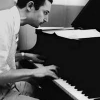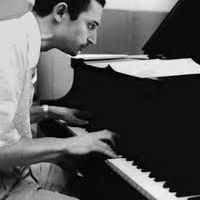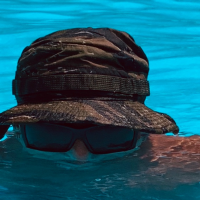Home » Jazz Musicians » Russ Freeman
Russ Freeman
Jazz pianist Russ Freeman, was a key figure in the career of Chet Baker in the 1950s, when the trumpeter was making some of his most distinctive music. Though his contribution was eclipsed by Baker's relationship with the charismatic Gerry Mulligan, he was an ideal collaborator, imparting focus and narrative shape to Baker's sound.
Born in Chicago, Freeman studied classical piano in Los Angeles. By the 1940s, when bebop was taking over New York's hip clubs, there were few west coast pianists who understood its harmonic complexities - and pianists, with their more sophisticated theoretical awareness, were often crucial to helping other instrumentalists get to grips with how the new idiom worked.
With his training, and a spare but flexible technique, Freeman grasped bebop's mechanics fast. At 21, he accompanied Charlie Parker in a Los Angeles gig; as James Gavin notes in his new Chet Baker biography, Freeman thought Parker was "the greatest musician who ever lived", and he hung out in New York with Parker's circle until the following year. He also began working with virtuosi like trumpeter Howard McGhee and saxophonists Dexter Gordon, Wardell Gray and Sonny Criss, his piano models being the east coast bop pianists Bud Powell and Joe Albany. Freeman's 1947 New York visit turned him into a heroin addict for four years, and, as he told James Gavin: "When you get really strung out, it's a 24-hour-a-day job. That's your life." During this period, he often worked with musicians in the same condition, notably saxophonist Art Pepper.
But in 1951, facing jail or even death, Freeman straightened out. He began rooming with Chet Baker and his wife Charlaine in the Hollywood Hills, and when Pacific Jazz offered Baker a recording deal in 1952, it was Freeman who picked and arranged the tunes, and explained the harmonies to the trumpeter, who could not read chords, on their living-room piano. Baker's characteristic style - embroidering the melodies with delicate alternative lines - emerged in these sessions, and Freeman, providing a sinewy alternative to Baker's vaporous style, contributed an invaluable contrast.
The relationship cut two ways. If Freeman's subtle pressure made Baker play better, Baker's intuitive improvising on the pianist's original pieces surprised and delighted the composer.
In the same year, Freeman worked with the Lighthouse Allstars, one of the most inventive west coast bop groups. Between 1953 and 1955, he toured with Baker, recorded with trumpeter Clifford Brown, travelled to Boston to play with saxophonist Serge Chaloff and worked in a creative piano-drums duo with Shelly Manne. "Instead of playing a drum solo or a piano solo in some spots," Freeman told writer Robert Gordon, "we'd play a solo at the same time, trying to feel each other out, with an awareness of each other being there."
Read moreTags
Shelly Manne: Jazz from the Pacific Northwest

by Stefano Merighi
I luoghi comuni sono vacui ma spesso azzeccano un frammento di sincerità. Dire che il jazz californiano anni '50 annacqua e depotenzia la forza afroamericana di questa musica è riduttivo, certo, ma indiscutibile almeno in certe sue declinazioni. È il caso di queste registrazioni del quintetto di Shelly Manne, frutto del concerto al festival di Monterey del 1958, recuperate e pubblicate dalla Real to Real, in un doppio CD che contiene anche alcuni brani di otto anni dopo, ...
Continue ReadingShelly Manne & His Men: Jazz From The Pacific Northwest

by Pierre Giroux
Shelly Manne & His Men are presented in two iterations in never-before-released live recordings from the 1958 Monterey Jazz Festival and from a 1966 date at The Penthouse in Seattle entitled Jazz From The Pacific Northwest. In this deluxe limited edition 180-gram 2LP set, co-produced for release by the estimable Zev Feldman and Cory Weeds, the band captivated the audience with intricate melodies and vibrant improvisations driven by Manne's virtuosic drumming. The band on LP1 from ...
Continue ReadingArt Pepper: The Return of Art Pepper

by C. Michael Bailey
Alto saxophonist Art Pepper's first incarceration for drugs took place between August 1954 and July 1956, a period conspicuous for Pepper's absence from the recording studio. Pepper's first recording as a leader after his release was, aptly, The Return of Art Pepper. He had been busy as a sideman for trumpeters Shorty Rogers (Big Shorty Express (RCA, 1956)) and Chet Baker (The Route (Pacific Jazz, 1956)) before entering Capitol Studios on August 5, 1956 to record the ten pieces that ...
Continue ReadingRuss Freeman/Shellly Manne: One on One

by Craig Jolley
Pianist Russ Freeman made his name on the 1950's California scene with trumpeter Chet Baker's quartet and in Shelly Manne's quintet. He moved to the studios begininng in the early 1960's, occasionally taking time out to play real music such as this 1982 duet with drummer Shelly Manne. This record is a follow-up to a 1954 Freeman - Manne duet, The Two (Contemporary). (There is also a 1957 trio with Freeman, Manne, and Andre Previn, Batter Up (Contemporary), with a ...
Continue ReadingChet Baker: Chet Baker and Strings

by C. Michael Bailey
With Strings. I have been listening to a several recordings of Jazz artists performing with a string section, including: Clifford Brown With Strings (Emarcy 814 642), Charlie Parker with Strings (Verve 314 523), Art Pepper's Winter Moon (OJC 677), Wynton Marsalis' Midnight Blues: Standard Time Volume 5 (Columbia 68921), and most recently, Chet Baker and Strings (Columbia Legacy 65562). I am enamored with all of these discs. Some of them have stood the test of time, some have not. They ...
Continue ReadingThe Rippingtons Featuring Russ Freeman Release 22nd Album "True Stories" June 24 In Celebration Of 30th Anniversary Year On Peak Records/Entertainment One

Source:
EastWest Media
True Stories recorded over an intensive three-month span, is a refreshing elixir that will delight devout fans of The Rippingtons and attract new ones. Joined by original Rippington, alto and soprano saxophonist Brandon Fields, drummer Dave Karasony, bassist and rhodes player Rico Belled and special guest Jeffrey Osborne, Freeman orchestrates ten compelling originals. On True Stories Freeman’s choice of axe is a Patrick Cummings gold custom Brian Moore 30th Anniversary Russ Freeman model guitar. He plays it on all the ...
read more
Russ Freeman: West Coast Poet

Source:
JazzWax by Marc Myers
Russ Freeman was one of the most recorded ensemble pianists on the West Coast in the 1950s and one of the most poetic. His first recording was with Charlie Parker at a Los Angeles club in 1947, but once the LP made inroads in the early 1950s, Freeman recorded steadily with Chet Baker, John Graas, Shorty Rogers, Maynard Ferguson, Shelly Manne and many other artists. Freeman died in 2002 at age 75. Here are a few clips of Freeman's pretty ...
read more
Russ Freeman in Canada

Source:
Rifftides by Doug Ramsey
To those who who knew Russ Freeman or his work it was a source of frustration that he elected during his final years not to play the piano. Freeman died in 2002 at the age of 76. He was part of the west coast jazz scene before it was called that. He worked in Los Angeles in the late forties and early fifties with Howard McGhee, Charlie Parker, Dexter Gordon and other bop musicians. Then he got famous as the ...
read more
Russ Freeman: Important West Coast Pianist Dies at 76

Source:
All About Jazz
Born May 28, 1926, Pianist Russ Freeman (full name Russell Donald Freeman) was best known for his work with trumpeter Chet Baker and drummer Shelly Manne in the 1950s. Although born in Chicago, he did most of his playign and recording in Los Angeles (although he did record with Serge Chaloff in Boston in 1954). He worked with most if not all of the major West Coast jazz names, including Dexter Gordon, Wardell Gray, Sonny Criss, Chet Baker, Shelly Manne, ...
read more
































